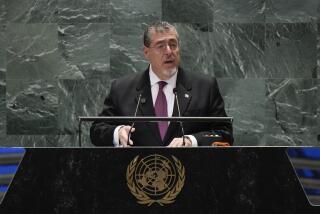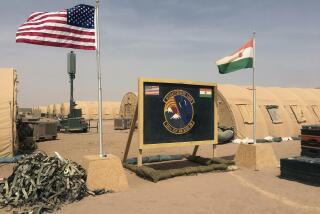U.N. Doubles Sierra Leone Deployment, Boosts Powers
- Share via
UNITED NATIONS — The Security Council on Monday doubled the number of U.N. troops to be deployed in the West African nation of Sierra Leone, giving them new powers to defend themselves and civilians after several embarrassing incidents in which peacekeepers in charge of disarmament were stripped of their own arms by rebels.
The council voted unanimously to increase the force from 6,000 to 11,100, which will make it the U.N.’s largest field operation.
The U.N. Mission in Sierra Leone, established in October, is being expanded to replace departing West African troops who expelled the rebels from the capital, Freetown, and helped restore President Ahmad Tejan Kabbah to power. Some Nigerian soldiers from the West African coalition will join the U.N. force, trading their hats for the peacekeepers’ trademark blue helmets.
The new deployment order comes at a crucial time in Sierra Leone’s faltering peace. A cease-fire signed in July was expected to end the country’s particularly brutal eight-year civil war. When rebels were forced to retreat from Freetown last year, they cut off the arms, legs and ears of many civilians, including children, on their way out, and hundreds of children were abducted to be trained as young rebel warriors.
Despite the peace accord, rebels have continued to loot villages, burn houses and rape women, U.N. human rights monitors say.
Most alarming for the prospect of peace, the rebels have seized weapons from Guinean and U.N. soldiers three times in the last month, “placing the U.N. troops in the bizarre situation of being disarmed by the rebels, rather than the reverse,” Nancy Soderberg, a U.S. diplomat at the U.N., said before Monday’s vote.
The soldiers surrendered their arms without resistance because they had been told not to enter combat. Guidelines for the new troops will allow them to use force in self-defense or to protect civilians, a response to complaints that U.N. soldiers are often deployed in numbers large enough to raise expectations but with a mandate too small to fulfill them.
“This is a sign that we are learning the lessons of past mistakes,” Canadian Ambassador Robert Fowler told the Security Council on Monday.
The new deployment also might mark a turning point in U.S. attitudes toward involvement in U.N. peacekeeping operations, especially in Africa. Since 18 American soldiers were killed in Somalia in 1993, and the bodies of several of them dragged through the streets, Washington has been reluctant to contribute troops to peacekeeping missions. But the U.S. sponsored the Month of Africa in the Security Council in January and is now fulfilling promises for more participation on the continent.
The U.S. has pledged $80 million for the mission in Sierra Leone. While Congress must still approve that amount, the situation is being described in Washington as a make-or-break moment for the region. On Thursday, CIA Director George J. Tenet told Congress that the rebels are “poised to break a tenuous cease-fire and resume a campaign of terror.”
After peacekeeping “disasters” in Somalia and Bosnia-Herzegovina, said Richard Holbrooke, U.S. ambassador to the U.N., “this is our chance to get it right.”
More to Read
Sign up for Essential California
The most important California stories and recommendations in your inbox every morning.
You may occasionally receive promotional content from the Los Angeles Times.












